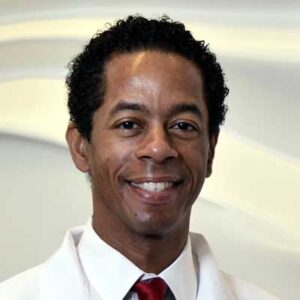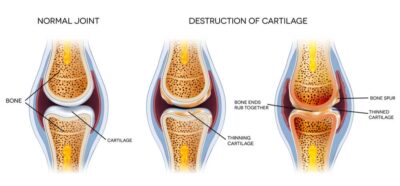Knee Arthritis Specialist

There are different types of arthritis in the knee, but the two most common are osteoarthritis and rheumatoid arthritis. If you are experiencing pain and swelling of the knee, joint stiffness, knee instability and creaking or popping of the joint, you may have arthritis of the knee. Knee arthritis specialist, Doctor Riley J. Williams provides diagnosis as well as surgical and nonsurgical treatment options for patients in Manhattan, Brooklyn, New York City and surrounding areas who are suffering from the symptoms of knee arthritis. Contact Dr. Williams’ team today!
What is arthritis of the knee?
Osteoarthritis is the most common form of arthritis. Arthritis occurs when the protective cushion between the joints, known as articular cartilage, erodes or wears down over time. Osteoarthritis (OA) is also known as wear-and-tear arthritis; OA can cause pain, stiffness, swelling and inflammation due to the lack of shock absorbing cushioning in the joints. Sometimes bone spurs can develop because of the OA associated bone-on-bone condition in the knee. The formation of additional bone (bone spurs) is one of the ways the body tries to stabilize the arthritic joint by inhibiting movement and reducing rubbing. Arthritis of the knee is very common, especially in persons over the age of 50, but OA can affect individuals of any age. OA can be hereditary or result from an injury (ligament tear, broken bone). The knee is comprised of the femur (thighbone), the upper end of the tibia (shinbone) and patella (kneecap). Inside of the knee, articular cartilage lines the ends of these bones, allowing the knee to glide smoothly while bending and straightening. While osteoarthritis is degenerative, and no cure exists, maintaining a healthy weight, staying strong by exercising, and paying close attention to one’s activity level can slow the progression of symptomatic osteoarthritis of the knee. Dr. Riley J. Williams, orthopedic knee specialist serving Manhattan, Brooklyn, New York City, NY and surrounding areas, has extensive experience in treating arthritis in the knee and other osteoarthritis ailments.
What are the symptoms of arthritis of the knee?
Individuals in the New York area often experience symptoms that usually develop and worsen over time such as:
- Pain
- Stiffness, especially after resting for long periods of time
- Swelling
- Warm or reddened skin on the affected knee
- Locking or catching of the knee
- Cracking or grinding noises when the knee moves
- Difficulty bending the knee
- Achiness of the knee associated with changes in the weather
How is osteoarthritis in the knee diagnosed?
Dr. Williams will begin his diagnosis with a physical examination of the knee. He will inquire about medical history. Osteoarthritis can be hereditary, brought upon from injury or from general wear and tear. Dr. Williams will look for swelling, redness around the injured area, problems with your gait, instability in the knee and crepitus (cracking sound inside the joint) with movement. The next step may be to order x-rays, which will provide Dr. Williams with images of the bone. X-rays can help determine the type of arthritis and if bone spurs have developed. Blood tests may also be ordered to further determine the type of arthritis to help ensure a proper diagnosis. Often Dr. Williams will need to assess the articular cartilage and will order an MRI Scan. This diagnostic test will help him determine the amount of damage to the cartilage surface of the knee.
What treatment options are available for arthritis of the knee?
Non-surgical treatment:
There is no cure for osteoarthritis, but certain lifestyle changes can slow the progression, such as maintaining a healthy weight and exercising to maintain bone density and muscle strength. There are several things a patient can do for arthritis pain management:
- Activity Modification. Participating in lower impact sports such as swimming, cycling, rowing compared to running. These lower impact activities allow for cardio training without high load being put upon the arthritis knee.
- When arthritis pain increases from overuse, rest and take anti-inflammatory medication, such as ibuprofen, which can help decrease pain, swelling and tenderness.
- A knee brace (unloader brace) may be prescribed to give added support and take the strain off the knee.
- Williams may recommend physical therapy to strengthen muscles around the knee and increase mobility. This method has been shown to be very effective in patients older than 50 years of age.
- Another treatment option is the use of corticosteroids or cortisone. This is an injection in the knee that can help with pain and swelling. It is not recommended to get more than three or four injections a year. Joint damage can increase instead of decrease with the overuse of cortisone injections.
- Biologic treatments including hyaluronic acid (gel) injections, platelet rich plasma (blood spin) injection, bone marrow blood injection, adipose (fat) base stem cell injections can also be effective in the non-surgical treatment of arthritic joints.
Surgical treatment:
Dr. Williams may recommend surgery if conservative methods have failed. The scope of surgery will be dependent upon factors such as age and the affected area. There are several different types of procedures that Dr. Williams will discuss with you to determine what is appropriate for your injury. This could include:
- Knee arthroscopy to clean up affected areas of bone, cartilage or meniscus injuries associated with OA
- Cartilage repair or grafting (usually reserved for patients with isolated cartilage lesions)
- Osteotomy, for early-stage osteoarthritis and younger patients
- A partial or total knee replacement or resurfacing.
Physical therapy and the use of a brace or crutches may be necessary to ensure proper healing after a surgical treatment for arthritis of the knee.
For more information on arthritis of the knee and the treatment options available, please contact the office of Riley J. Williams, MD, orthopedic knee specialist serving Manhattan, Brooklyn, New York City, NY and surrounding areas.
Locations
610 W 58th Street
New York, NY 10019
148 39th Street, 7th Floor
Brooklyn, NY 11232



